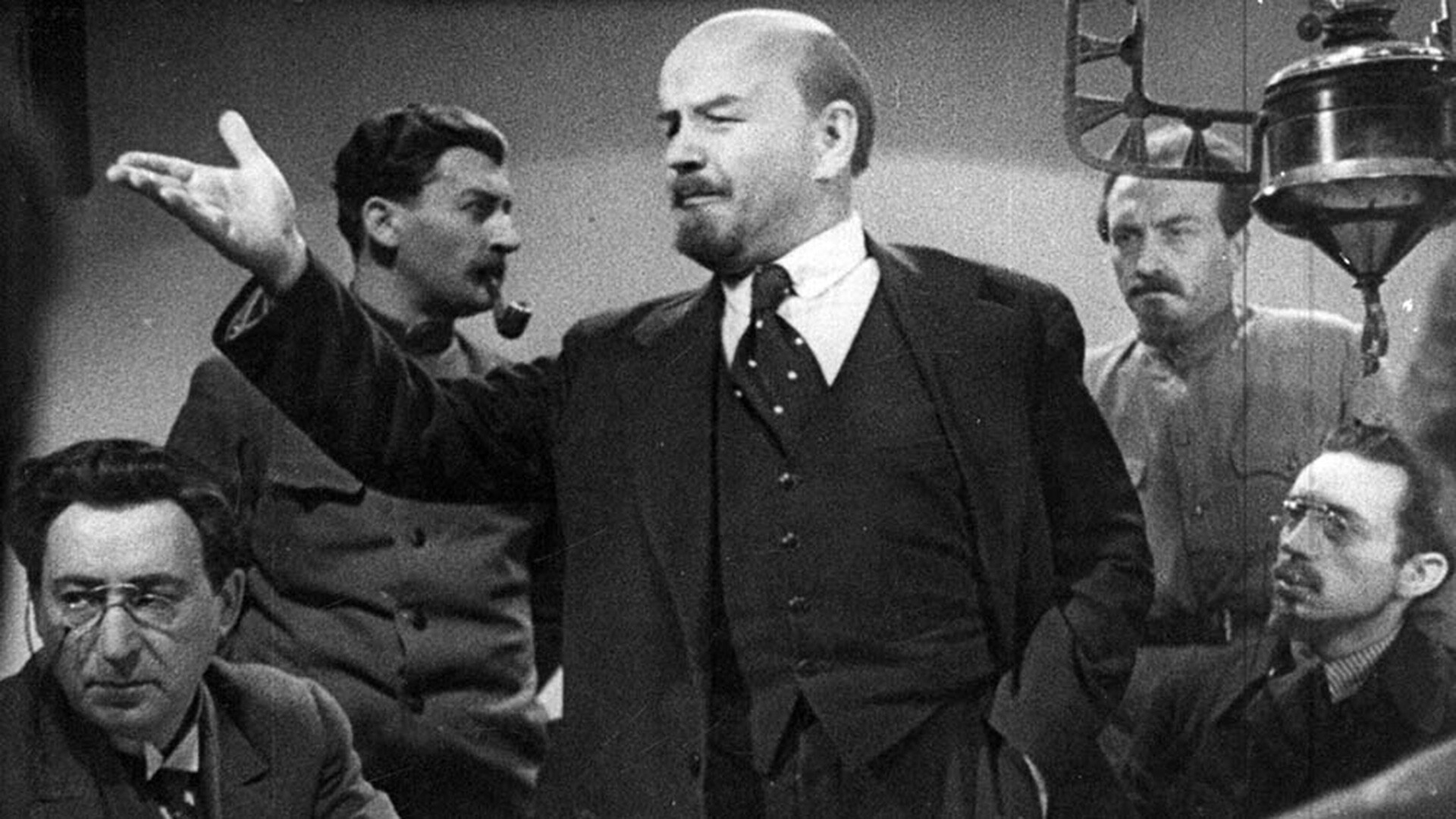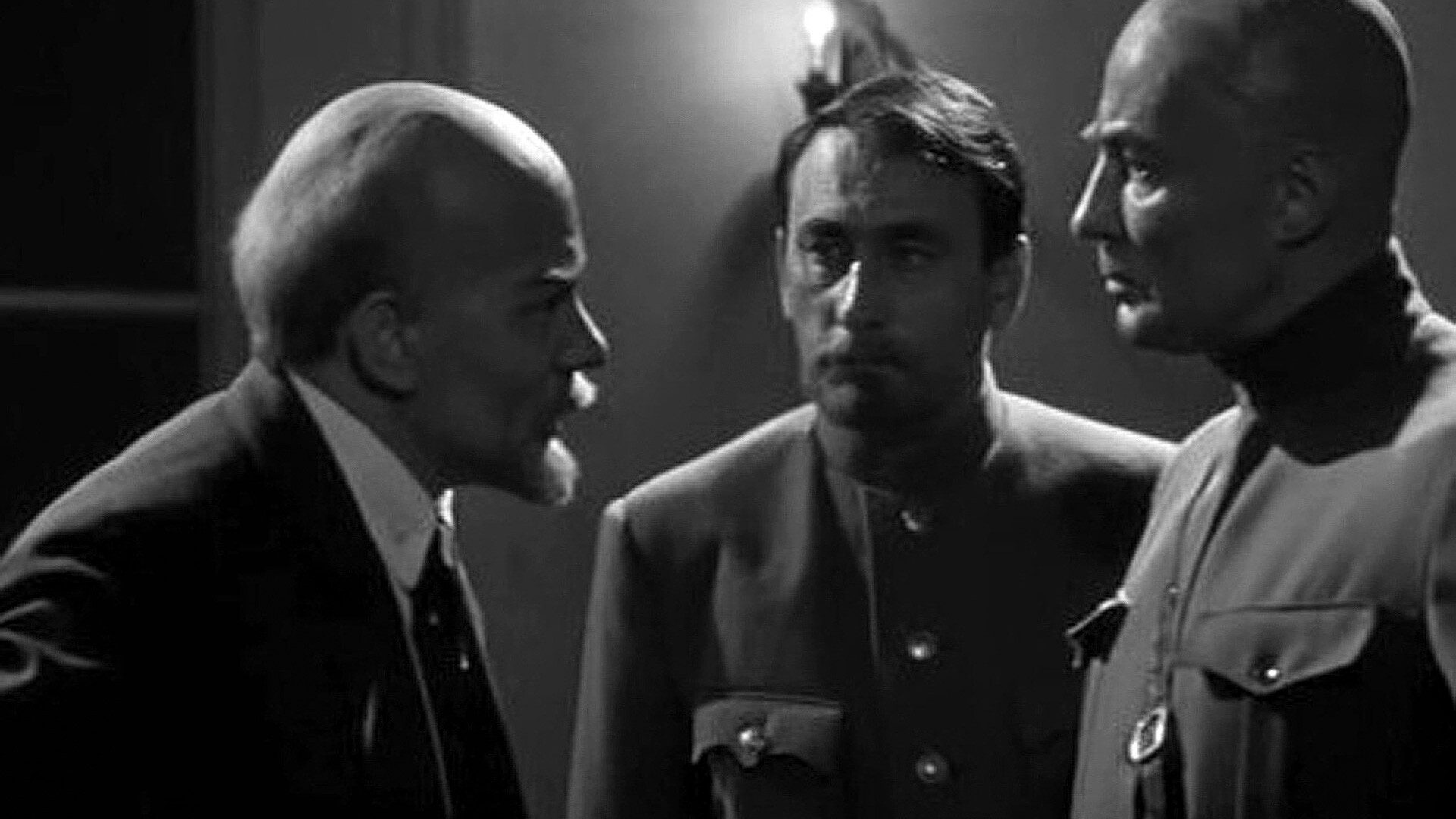
5 movies about Vladimir Lenin that you can watch ONLINE

1. ‘October: Ten Days That Shook the World’ (1927), directed by Sergei Eisenstein

The first actor to play Lenin was Vasily Nikandrov – a retired metallurgical factory worker and an amateur actor, who astonished his contemporaries with his picture-perfect likeness to Vladimir Lenin. However, Nikandrov was larger and, through Eisenstein’s efforts, he appeared on screen as a monumental figure, leaving viewers awestruck. During his first appearance, Lenin hops on top of an armored car with a banner in his hands, inspiring the crowd with his revolutionary speeches in the shine of searchlights. This is a silent film – we don’t hear voices, but we see his characteristic energetic gesticulation. The wind blows back his coat like a superhero cloak.
Nadezhda Krupskaya, Lenin’s widow, liked Nikandrov’s performance very much; but, for example, it angered Vladimir Mayakovsky: “It’s repulsive to see how a man takes similar poses to Lenin and makes similar movements – and, behind this likeness, appears complete emptiness, complete absence of thought.” Apart from ‘October’, Nikandrov also starred as Lenin in the movie ‘Moscow in October’ (1927) by Boris Barnet and in the play ‘1917’, staged by Maly Theater.
When Eisenstein filmed ‘October’, he was already a living legend after the international success of his ‘Battleship Potemkin’ (1925). The new movie was conceived as an official film for the 10th anniversary of the Revolution, so the director was provided with unprecedented conditions – everything was filmed not in pavilions, but at the sites where the real events took place. In particular, Eisenstein was allowed to bring armed extras to the Winter Palace, where, in October 1917, the Provisional Government resided, whose rule was toppled by the Red Army soldiers. Historians are convinced – Eisenstein didn’t even try to reconstruct the October Revolution, he knowingly was creating a myth and that’s why he radically stepped up the scale of the event and increased the number of participants.
2. ‘Lenin in October’ (1937), directed by Mikhail Romm

In this movie, Lenin finally spoke. Actor Boris Shchukin created the canonical image of the leader of the Bolsheviks – a man of the people. A lively man with dyslalia and a wily, even sarcastic look, whose charm is impossible to resist. The October Revolution was once again put under the spotlight in this movie. This is one of the most tense moments in the biography of Lenin and his associates; however, we see neither stress nor worry – the events are more reminiscent of a game. Two years later, Shchukin would return to the role of Lenin in the sequel ‘Lenin in 1918’ (1939).
‘Lenin in October’ was filmed for the 20th anniversary of the Revolution – during the period of the cult of Stalin’s personality and in the midst of repressions, so the price of a creative mistake was extremely high. However, young director Mikhail Romm, it seemed, managed to please everyone; later, he would direct one of the main ‘Thaw’ era movies, ‘Nine Days in One Year’ (1962), and give rise to several generations of directors (Andrei Tarkovsky, Sergei Solovyov, among others). He also pleased Stalin, who was portrayed as a close associate of Lenin and an active participant of the events in October. Under Khrushchev, when the cult of personality was denounced, Stalin was fully cut out of the movie.
3. ‘Lenin in Poland’ (1965), directed by Sergei Yutkevich

Along with Romm, Sergei Yutkevich is one of the main creators of the Soviet ‘Leniniana’. In total, he directed six movies about the leader of the proletariat. A student of Meyerhold and an associate of Eisenstein, Yutkevich would outlive almost all his colleagues from the 1920s generation of avant-garde artists (he died in 1985); with that, until the end of his life, he remained a formalist experimenter. For example, ‘Lenin in Poland’ was filmed under the apparent influence of Proust’s and Joyce’s prose and of western art films.
The action takes place in 1914, when the leader of the Bolsheviks was in emigration in the Polish lands of Austro-Hungary. There, he was arrested by the local police on suspicion of spying for the Russian Empire (!). Locked in a cell, without newspapers, books or conversations, Lenin dove into his thoughts – the director tried to capture this “stream of consciousness”. For the entire length of the movie, we only hear the off-screen voice of the main hero, voicing the freely wandering thoughts and commenting on the events from Lenin’s biography.
Maksim Shtraukh, who starred as Lenin, is more of an intelligentsia representative than Shchukin’s “man of the people”; he’s constantly in doubt, self-reflecting and full of compassion. It’s not a coincidence that another famous role in this actor’s filmography is ‘Doctor Aybolit’ (the Soviet version of ‘Doctor Dolittle’). Shtraukh would go on to play Lenin in six movies and three plays. Sergei Yutkevich received the Cannes Film Festival award for ‘Best Director’ for his ‘Lenin in Poland’.
4. ‘The Sixth of July’ (1968), directed by Yuli Karasik

This movie is dedicated to a short episode of the Civil War – the uprising of the Left SR in July 1918. After the October Revolution, the Left SR – representing the interests of peasants – and the Bolshevik Party – representing the workers – created a government coalition, which crumbled, because of the question of whether or not the country’s participation in World War I should continue. The Bolsheviks came to power riding anti-war sentiments, so, in March 1918, they hastily signed the very unfavorable Treaty of Brest-Litovsk with the Germans. The Left SR opposed the predatory terms of the treaty and led an uprising.
In this Thaw-era movie, we see a completely different Lenin – actor Yury Kayurov (who played Lenin in 18 movies) doesn’t empathize his dyslalia and doesn’t copy his articulate gesticulation that had become a trope. For the first time, we see the politician Lenin, who doesn’t rush to the forefront and, instead, leads a sharp political intrigue against his opponents. The film is made in the semi-documentary style – all characters are business-like, focused and much more realistic than in the historical-revolutionary movies of years past.
5. ‘Taurus’ (2001), directed by Alexander Sokurov

Alexander Sokurov, considered to be one of the brightest art film directors of the new Russia, directed a movie about Lenin’s biography period that couldn’t have been put on screen during the Soviet years – about the slow, physical withering of the leader.
All events of the movie take place in the span of one summer day. Lenin (played by Leonid Mozgovoy) lives his last months in his Gorki residence. His memory betrays him, his body refuses to obey him. Finally, the most painful torture for the politician – he’s cut off from the outside world and doesn’t decide anything anymore, although, formally, he’s still listed as the leader of the party. Unable to handle this torment, Lenin asks Stalin to give him poison. The latter promises to discuss this question at the Politburo.
‘Taurus’ is the second movie of Sokurov’s series about power, including also such movies as ‘Moloch’ about Hitler, ‘The Sun’ about Emperor Hirohito, a Goethe’s ‘Faust’ adaptation (which won the Golden Lion at the Venice International Film Festival) and ‘Fairytale’ – a parable about the afterlife for political leaders.












